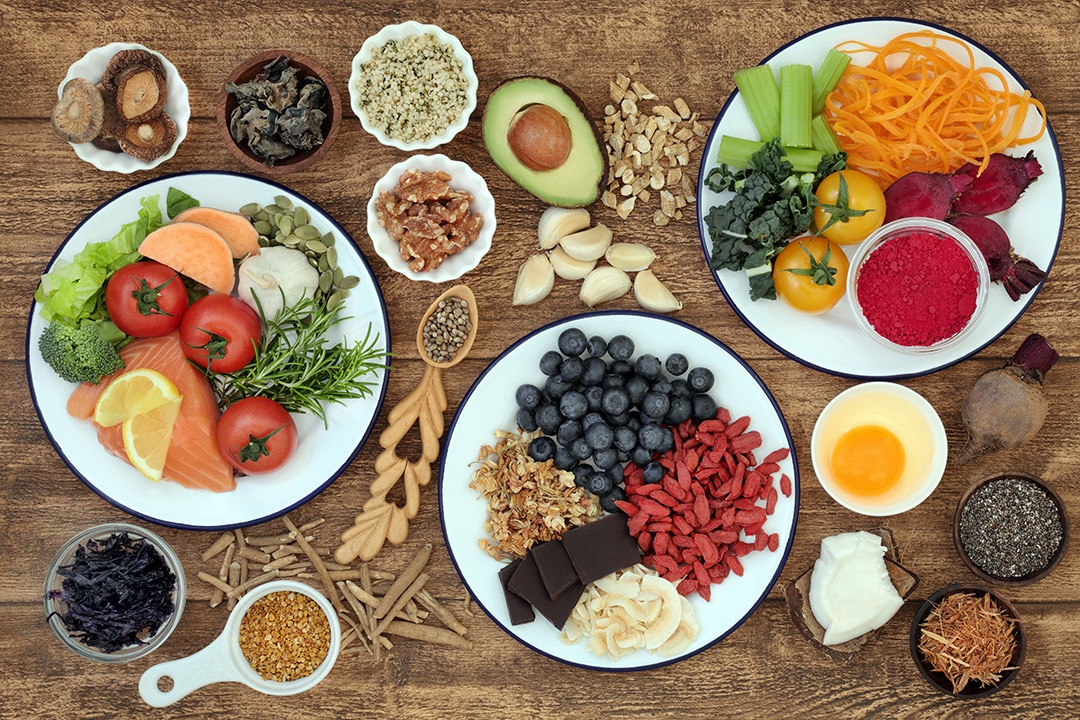Blog, Functional Food
What Makes a Food Functional?
Functional foods are all the rage these days. You’ve likely seen these words on products in the grocery store or being advertised online. Many of these products come with promises of better health and claim to solve problems like low energy, poor libido, high stress, anxiety, depression, and sleeplessness. So, what makes a food functional? The Mayo Clinic defines functional food as “…foods that have a potentially positive effect on health beyond nutrition.”. Many types of foods are functional food. It will likely come as no surprise to learn that fruit like berries, vegetables like kale, nuts, seeds, and whole grains are generally considered a functional food. However, you may be surprised to learn that coffee is a functional food. Caffeine offers many benefits and coffee itself is full of powerful plant compounds like flavonoids. Functional foods can also be made by fortifying nutritional foods like peanut butter or bread with functional ingredients like fish oils and vitamins.
What are Functional Ingredients?
A functional ingredient is one that has additional health benefits beyond simple nutrition, offers probiotics, or contains nutraceuticals, like antioxidants. For example, cheddar cheese is a nutritious food. But it is not functional—it mostly provides protein, fat, and some vitamins and minerals. Kefir, a fermented milk product, is a functional food because it provides large amounts of healthful probiotic organisms which are highly beneficial for digestion and immunity. Anything that provides functional amounts of a functional ingredient or ingredients, is considered a functional food. In this section, we’ll explore four functional ingredients found in Seattle Gummy Company’s popular energy gummy, the Mocca Shot. One ingredient might surprise you!
1. Caffeine
Let’s go down the list of caffeine’s remarkable health benefits.
- Caffeine increases the production of an enzyme in the brain that prevents dementia and other cognitive diseases.
- Caffeine increases your ability to solve problems.
- Caffeine reduces pain during and after workouts.
- It may help you lose weight by stimulating fat-burning brown adipose tissue (BAT).
- Caffeine may reduce health risks associated with a high-fat diet, specifically by decreasing fat tissue production.
- Caffeine is an effective treatment for exercise-induced asthma. It’s as effective as medication.
- Caffeine increases your sports performance.
- It may also help people who suffer from dry eyes by increasing tear production.
2. B Vitamins
B vitamins help your body make energy and are essential for healthy brain function. They directly impact mental and emotional health, offering support to anyone who is under stress, or experiencing anxiety and/or depression. B vitamins also:
-
Support cell health.
-
Help grow red blood cells.
-
Are used to make energy.
-
Support healthy eyesight.
-
Help the body digest food.
-
Support a healthy appetite.
-
Keep your nerves healthy.
-
Help the body make hormones and cholesterol.
-
Support heart health.
-
Are used to tone muscles.
3. Ginkgo biloba
A revered herb in Chinese Medicine, ginkgo biloba is used to support both the brain and the cardiovascular system. This herb contains powerful antioxidants that have a particular affinity for the heart. Ginkgo biloba contains high levels of flavonoids and terpenoids, which are strong antioxidants. Antioxidants protect cells from damage from free radicals, which are unstable molecules that will steal electrons from healthy cells. Antioxidants can neutralize free radicals with a spare electron, which prevents cellular damage.
Ginkgo biloba is also excellent for memory and cognitive function, since its support of the cardiovascular system stimulates circulation to the brain. This means that ginkgo biloba is often used to support memory, as well as stress and mental health issues like anxiety and depression.
4. Dutch Cocoa
Does this surprise you? Cocoa is a highly functional food, rich in nutrients and powerful antioxidants. Cocoa also supports the cardiovascular system by lowering blood pressure and making arteries more supple. It also increases good cholesterol while lowering bad cholesterol and supports the immune system. In addition, cocoa protects the skin from sun damage, which supports anti-aging. Cocoa may also increase circulation to the brain, which makes sense given its effects on the cardiovascular system.
What is Functional Food Dusting?
In the functional food market, it’s a good idea to use a discerning eye on your functional food product purchases. The whole point of functional food is to make a marked impact on your physical health. This requires a functional dose of the functional ingredient. A common practice, called “dusting” or “pixie dusting”, is when companies make products with small amounts of functional ingredients, but still charge more for the product. Look for functional ingredients either at the top of the ingredient list or with high percentages listed in the nutritional information. With some savvy shopping, you can take advantage of all that functional foods have to offer.

